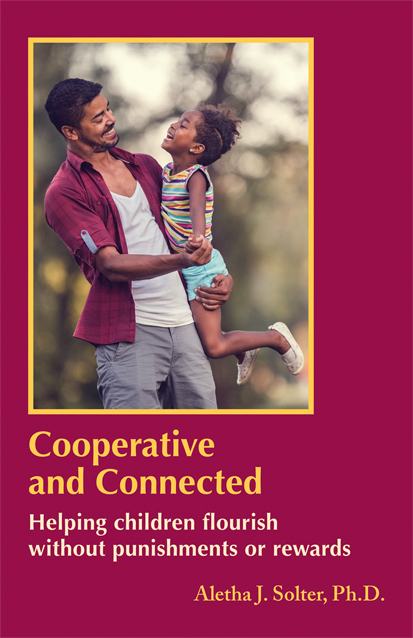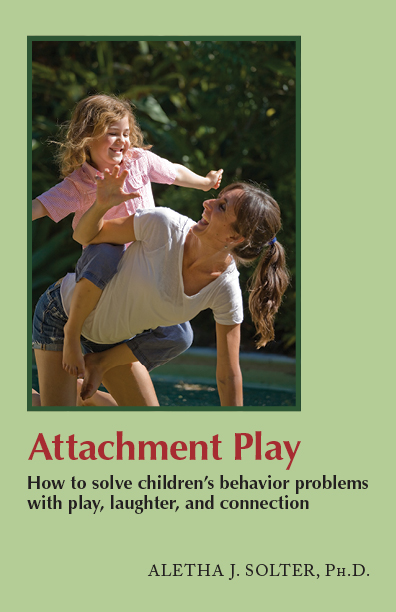Kindergartner reluctant to go to school
by Aletha Solter, Ph.D.
Question:
My son will be five years old in November, and he recently started kindergarten. The first two weeks were fine with no tears, but since then he has become increasingly reluctant to go to school. The night before each school day he starts to talk about how much he doesn't want to go, and he pleads with me not to make him go. When he is in the school after a few minutes of tears, he is fine until the children have to go outside for morning recess. Then he starts to cry again. The teacher has told him he has to go out and he has to accept this, and she has also given him a "buddy" for the day to see if this will help. So far, nothing is working. Do you have any suggestions how best to calm his fears and make it easier for my son to deal with all the changes occurring since starting kindergarten?
Answer:
There are several possible reasons for your son's reluctance to go to school.
My first thought is that he may not yet be ready for kindergarten. He is still four years old, and most of the other children have probably already had their fifth birthday. So he is a young kindergartner. Some children with fall birthdays do much better if they are given another year to stay home or attend preschool. This allows them an extra year to mature. Then, when they start kindergarten the following year, they are one of the oldest instead of one of the youngest children in the class.
Another possibility is that your son is reacting to an authoritarian or oppressive environment at school. Is the teacher harsh or cold? If so, would it be possible to switch him to another class? Perhaps the methods of instruction are not suited to his individual learning style. Is the classroom developmentally appropriate? Are there opportunities for movement, play, hands-on activities, and games? Do the children have choices? Is there over-emphasis on academics, worksheets, and drills? A teacher using inappropriate methods could very well be a source of stress and resistance for a child.
Perhaps your son is having problems making friends. Some children, especially if they are younger than others in a group, have a hard time integrating into a new group and making friends. The idea of giving him a special buddy sounds like a good idea. But maybe he needs time to develop individual friendships with the other children in the class. You could help by inviting one of his classmates to your home for a play date to help your son develop a friendship in his home environment. Ask him who he would like to invite, and then make arrangements with the parents.
A reluctance to go to school can also be related to the home situation. Is there some unusual stress at home? (for example, a recent move, a new sibling, parental divorce, family illness, financial problems, new job, etc.?). If there is any stress in your family, this will affect your son and make it difficult for him to handle new situations such as school, because stress increases a child's attachment needs. It is only natural that he would feel anxious and reluctant to be separated from you and that he would have a hard time coping with transitions at school. Or perhaps he is simply feeling that he doesn't spend enough time with you.
I suggest that you begin by listening attentively to your son when he talks about not wanting to go to school. Try to reflect back his feelings and encourage him to tell you specifically what he doesn't like and why he doesn't want to go. If you really listen to him, he might give you a clue to his reluctance to go, and he might even have some ideas for a solution. I also recommend having a conference with your son and his teacher. Together, you can try to figure out some ways to make school less stressful and more agreeable for him.
Another suggestion is for you to observe your son's class. Perhaps you will discover the source of his difficulties. It may be helpful for you to become actively involved in the school as a classroom volunteer. If you work during school hours, perhaps you could arrange for your son's class to come to your place of work on a field trip. Any way that you can become actively involved will help your son to feel more comfortable and secure at school.
A final suggestion I have for you is to play "school" with your son at home. Let him be the teacher while you play the role of a child. This role-playing serves several purposes. First of all, it will give you some insight into your son's perception of the teacher's methods of instruction and discipline. Secondly, by role-playing school, your son will have the opportunity to process the experience of school, both emotionally and cognitively. Some of his fears and difficulties will probably come out in the role playing, and he can deal with them through play. If he feels powerless and anxious at school, this play can help him release tensions through laughter. It can also help him feel more in control by playing the role of the teacher.
To conclude, my general philosophy about schools is this: If a child doesn't want to go to school, there is usually a very good, legitimate reason for this reluctance. Rather than make children conform to schools, we need to focus on ways to help schools meet the needs of children. We need to look for the underlying reasons and sources of difficulty, as described in the suggestions above.
About Aletha Solter:
Aletha Solter, PhD, is a developmental psychologist, international speaker, consultant, and founder of the Aware Parenting Institute. Her books have been translated into many languages, and she is recognized internationally as an expert on attachment, trauma, and non-punitive discipline.
Aware Parenting is a philosophy of child-rearing that has the potential to change the world. Based on cutting-edge research and insights in child development, Aware Parenting questions most traditional assumptions about raising children, and proposes a new approach that can profoundly shift a parent's relationship with his or her child. Parents who follow this approach raise children who are bright, compassionate, competent, nonviolent, and drug free.

